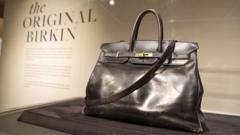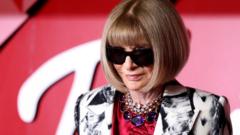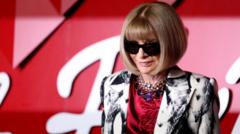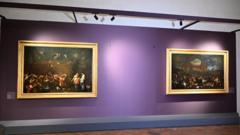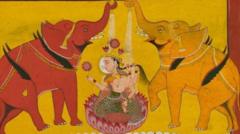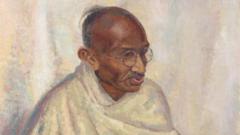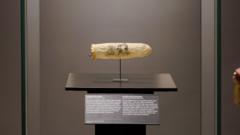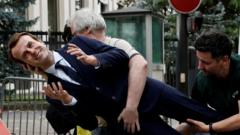*In an exclusive interview, Anna Wintour shares insights from her decades-long career and the launch of the immersive exhibition, VOGUE: Inventing the Runway.*
**Anna Wintour Opens Up About Her Iconic Style and the Evolution of Fashion**
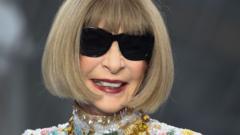
**Anna Wintour Opens Up About Her Iconic Style and the Evolution of Fashion**
*The Vogue editor-in-chief discusses her trademark sunglasses, the art of 'no,' and the democratization of fashion.*
As I sit down with Anna Wintour, the formidable editor-in-chief of Vogue since 1988, she strides in wearing her signature dark sunglasses, a common sight at high-profile fashion events. The interview takes place in a dimly lit underground venue, which hosts her latest project, VOGUE: Inventing the Runway, an exhibition celebrating the rich history of catwalk experiences.
With an enigmatic smile, I inquire about the purpose behind her iconic eyewear. "They help me see and help me not see,” Wintour muses, adding, “They are a prop.” This duality might reflect her multifaceted position in fashion, where she has governed trends and shone a spotlight on artistry over the decades, often seated front-row at the industry's most prestigious shows.
The Lightroom venue captivates audiences with advanced digital projections and audio, making past runway shows feel alive again. Wintour acknowledges a certain familiarity that breeds comfort from constant exposure to fashion spectacles. For the exhibition, the goal is to recreate the awe of catwalks for attendees who may not have the chance to attend live shows.
Wintour, who has navigated the fashion world since the early 1980s, recounts the moments she's spent waiting for shows to begin, sometimes enduring late starts that tested industry patience. She shared a memorable instance when designer Marc Jacobs delayed his show by an hour and a half, only to heed collective complaints by starting his next show ahead of schedule.
The exhibition traces a journey through fashion's evolution, from the elitism of early haute couture to the more inclusive and diverse scene today, prominently showcased by Pharrell Williams's recent show for Louis Vuitton. “Now everyone can come to the party, which is as it should be,” Wintour states regarding this democratization of fashion.
The showcase also reflects on groundbreaking moments, like Karl Lagerfeld's inventive runway sets. As Wintour recounts, Lagerfeld’s vision made each show unforgettable, keeping industry insiders on their toes and captivating the public's imagination.
Wintour has long been a key influencer within the fashion and celebrity nexus, steering events like the iconic Met Gala, which melds fashion with stardom in a dazzling media frenzy. Many curious outsiders ponder Wintour's resemblances to the fictional Miranda Priestly from "The Devil Wears Prada," a role that has overshadowed her career in some ways. When questioned about this comparison, Wintour is nonchalant, expressing that it's up to observers to draw their conclusions.
In the discussion of her public persona, Wintour emphasizes her dedication to her creativity rather than the theatrics of her role. She dismisses the notion that anyone is unwilling to challenge her, promoting the importance of 'no.' “That is absolutely untrue... No is a wonderful word,” she asserts.
While many view her as an authoritative figure, Wintour's influence and strategic vision have transformed Vogue into a modern powerhouse, deftly adapting to a landscape where social media and influencers reign. She defends fashion journalism against accusations of being superficial, recognizing its role in a vast and impactful industry with millions employed globally.
With no imminent plans to step down from her esteemed position at age 75, Wintour remains committed to her role, ensuring Vogue's legacy continues into the future. The immersive exhibition, VOGUE: Inventing the Runway, runs in London until April 2025, where fashion enthusiasts can explore Wintour’s curated history of the runway and its evolution.
With an enigmatic smile, I inquire about the purpose behind her iconic eyewear. "They help me see and help me not see,” Wintour muses, adding, “They are a prop.” This duality might reflect her multifaceted position in fashion, where she has governed trends and shone a spotlight on artistry over the decades, often seated front-row at the industry's most prestigious shows.
The Lightroom venue captivates audiences with advanced digital projections and audio, making past runway shows feel alive again. Wintour acknowledges a certain familiarity that breeds comfort from constant exposure to fashion spectacles. For the exhibition, the goal is to recreate the awe of catwalks for attendees who may not have the chance to attend live shows.
Wintour, who has navigated the fashion world since the early 1980s, recounts the moments she's spent waiting for shows to begin, sometimes enduring late starts that tested industry patience. She shared a memorable instance when designer Marc Jacobs delayed his show by an hour and a half, only to heed collective complaints by starting his next show ahead of schedule.
The exhibition traces a journey through fashion's evolution, from the elitism of early haute couture to the more inclusive and diverse scene today, prominently showcased by Pharrell Williams's recent show for Louis Vuitton. “Now everyone can come to the party, which is as it should be,” Wintour states regarding this democratization of fashion.
The showcase also reflects on groundbreaking moments, like Karl Lagerfeld's inventive runway sets. As Wintour recounts, Lagerfeld’s vision made each show unforgettable, keeping industry insiders on their toes and captivating the public's imagination.
Wintour has long been a key influencer within the fashion and celebrity nexus, steering events like the iconic Met Gala, which melds fashion with stardom in a dazzling media frenzy. Many curious outsiders ponder Wintour's resemblances to the fictional Miranda Priestly from "The Devil Wears Prada," a role that has overshadowed her career in some ways. When questioned about this comparison, Wintour is nonchalant, expressing that it's up to observers to draw their conclusions.
In the discussion of her public persona, Wintour emphasizes her dedication to her creativity rather than the theatrics of her role. She dismisses the notion that anyone is unwilling to challenge her, promoting the importance of 'no.' “That is absolutely untrue... No is a wonderful word,” she asserts.
While many view her as an authoritative figure, Wintour's influence and strategic vision have transformed Vogue into a modern powerhouse, deftly adapting to a landscape where social media and influencers reign. She defends fashion journalism against accusations of being superficial, recognizing its role in a vast and impactful industry with millions employed globally.
With no imminent plans to step down from her esteemed position at age 75, Wintour remains committed to her role, ensuring Vogue's legacy continues into the future. The immersive exhibition, VOGUE: Inventing the Runway, runs in London until April 2025, where fashion enthusiasts can explore Wintour’s curated history of the runway and its evolution.


